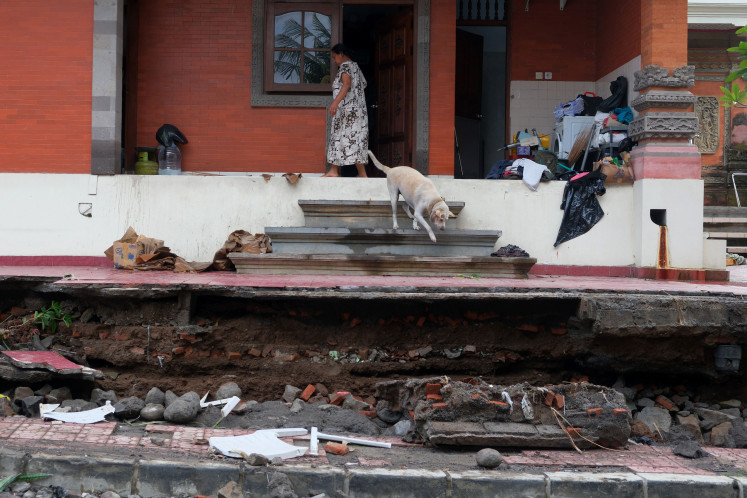Popular Reads
Top Results
Can't find what you're looking for?
View all search resultsPopular Reads
Top Results
Can't find what you're looking for?
View all search results'Urip iku Urub': Celebrates the achievements of British historian Peter Carey
Since conducting his first research in Indonesia in 1970s, Carey has shed light on the life and struggle of Diponegoro.
Change text size
Gift Premium Articles
to Anyone
A
newly released book celebrates the achievements of British historian Peter Carey, who has dedicated his career to tracking down the history of Indonesia’s foremost national hero, Prince Diponegoro.
The Javanese philosophy, urip iku urub (life is light), perfectly captures the spirit of British historian Peter Carey. Since conducting his first research in Indonesia in 1970s, Carey has shed light on the life and struggle of Diponegoro, a charismatic Javanese prince who rebelled against the Dutch in the 19th century.
Thus, it seems fitting to use the Javanese saying as the title of a book dedicated to appreciating Carey’s achievements. Urip iku Urub had its soft launching in Malang, East Java, on Nov. 7.
The 568-page book is packed with essays, reflections, memoirs, cartoons, field surveys and records written by 23 contributors, who are historians, cultural observers, artists and Carey’s colleagues.
The book also serves as a birthday present for Carey, who turned 70 in April.
“We tried to highlight the influence of Peter Carey on the study of Java,” said the book’s editor, FX Domini BB Hera, during its soft launch at Malang State University, East Java.
According to FX Domini, Malang was chosen as the launch’s venue due to its strong historical ties to Prince Diponegoro. The prince’s followers migrated to Malang, particularly Mount Kawi area after the Dutch captured Diponegoro in 1830.
The first chapter of the book, “Peter Carey in Reflection”, includes his brief biography and an article by former education minister Wardiman Djojonegoro, who along with Carey successfully nominated Babad Diponegoro (Autobiographical Chronicle of Diponegoro) to be included in UNESCO’s Memory of the World.
The second chapter consists of essays analyzing the impact of Carey’s studies in the contemporary art scene. One of the essays, titled “Diponegoro, Gerakan Nasionalis dan Seni Rupa” (Diponegoro, Nationalist Movement, and Fine Art) was written by Werner Kraus from the Center for Southeast Asian Art.
The next two chapters are dedicated to Prince Diponegoro, the main subject of Carey’s research in the last 50 years of his career.
The pinnacle of Prince Diponegoro as the greatest and last hero of Java’s old order is recorded in the third chapter. Meanwhile, the fourth chapter, titled “Five Years that Changed Everything”, consists of writings on Diponegoro’s Java War between 1825 and 1830.
The last chapter deals with the conditions after the fall of Java’s old order. In the chapter, Eka Ningtyas writes about the shifting approach in women’s education in the southern part of Central Java during the 19th-20th centuries.
Carey, who has lived in Indonesia since 2008, felt honored by this book.
“It’s not because of the articles about me, but due to a lot of substantial works presented by young writers,” he said.
Born in Rangoon, Myanmar, on April 30, 1948, Carey first learned about Diponegoro in elementary school in England. He saw the prince’s picture in a book and admired how the prince, despite his royal status, was close to his people and defended them.
Carey finally had a chance to research his childhood hero while writing a historical thesis for his doctorate in Oxford. He came to Indonesia in 1971 for the research and completed his thesis in 1973.
The cover of Urip iku Urub, showing a young Carey holding a prosthetic foot and what appears to be an explosive, refers to his time with Cambodia Trust, a British disability charity that he co-founded in 1989 to address the needs of mine victims in Cambodia.
He taught Asian history in Oxford for 35 years and has published much on the histories of Java, as well as Burma and East Timor, but Carey is best known for writing extensively about the Javanese prince. His notable works include The Power of Prophecy: Prince Dipanagara and the End of an Old Order in Java and Destiny: The Life of Prince Diponegoro of Yogyakarta 1785–1855.
Wardiman, who served as education minister from 1993 until 1998, admired Carey for his works on Diponegoro that are scientific but can be easily understood. Carey, in writing about the prince, managed to distance himself from a plethora of legends, fictional and politically bias accounts surrounding the prince.
FX Domini said Carey had gone through great lengths to track down the history of Prince Diponegoro. He looked for data in various places — from the National Library and Central Java palaces to the Royal Netherlands Institute for Southeast Asian Studies (KITLV) in Leiden and the British Library in London.
“He managed to meet with and interview several descendants of the prince in various regions in Indonesia,” the editor said.
FX Domini suggested that there only two national heroes whose histories have been scientifically and comprehensively written by foreign nationals. They are Carey and Dutch historian Harry Albert Poeze, who researched on Tan Malaka. Their writings and research help Indonesian people get better acquainted with their national luminaries.
Indonesia’s diversity and history, as Carey suggested, are great treasures that should be learned by the people and the nation.
“All this actually involves three simple questions that must be answered as a nation: Who are we? Where do we come from and where are we going?” he concluded.











